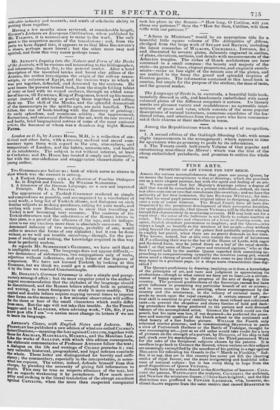Two Grammars are before us ; both of which serve
as straws to show which way the current is setting.
I. A Turkish Grammar ; with a Collection of Familiar Dialogues &c. in English and French. By WILIAM' ScHRoEDER. 2. A Grammar of the German Language, on a new and improved Principle. By L. A. DoNATTr.
The appearance of a Turkish Grammar rendered as simple and compendious as possible, and accompanied by a vocabulary of usual words, a long list of Turkish idioms, and dialogues on such familiar subjects as making purchases, calling for your meals, and settling with your Boniface, seems to show that travelling in Turkey is now becoming very common. The omission of the Turkish characters and the substitution of the Roman letters in their place, is a proof of the idleness of the age, and its indispo- sition to use any exertion more than is absolutely necessary. The determined industry of two mornings, probably of one, would suffice to master the forms of any alphabet ; but it can be done without, so we will not trouble ourselves,—though, for the pur- poses of reading and writing, the knowledge acquired in this way must be perfectly useless. As regards Mr. SCHROEDER'S Grammar, we have said that it is intelligible and easy. The language does not appear difficult,— two declensions of substantives, two conjugations only of verbs, adjectives without inflections, and easy forms of the degrees of comparison. We have not learned Turkish by looking at this Grammar, but we think we could get a sufficient smattering of it by the time we reached Constantinople.
Mr. DONATT1's German Grammar is also a simple and perspi- cuously arranged affair ; but its most singular point is the author's urgent recommendation that the alphabet of the language should be discontinued, and the Roman letters adopted both in printing and writing, to tempt foreigners to study it more readily. The capital and double letters require copying several times to imprint their forms on the memory ; a few minutes' observation will suffice for the three or four of the small characters which really differ from ours. But the age will not take this trouble. As the French beggar said to MALHERBE, when advising work, "Oh, Sir, if you knew Ow idle I am "—a nation must change its letters if we are to learn its language.


























 Previous page
Previous page